Personal Growth & Wellbeing
How to Build Resilience: A Practical Guide for Indians Dealing with Stress, Pressure & Change
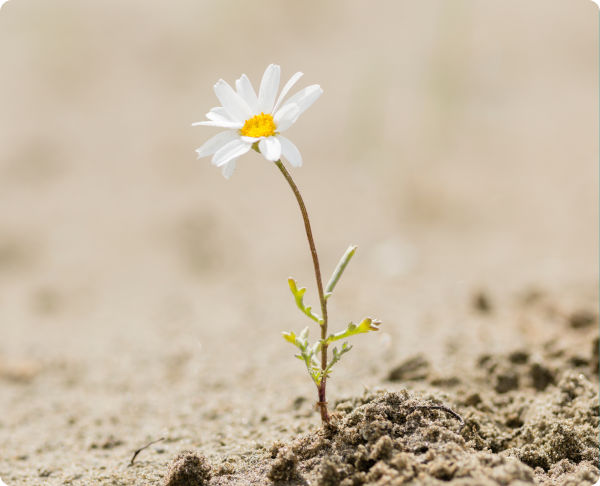
.png)
Written by
Aarohi Parakh,
Psychologist and Content Writer

Reviewed by
Sanjana Sivaram,
Psychologist and Clinical Content Head

Introduction – What Does It Really Mean to Be Resilient?
We’ve all heard the phrase “Be strong,” or “Don’t give up so easily.” But what does it truly mean to be resilient — especially in a country like India, where stress and expectations often weave through daily life?
In psychology, resilience refers to the ability to adapt and bounce back from adversity, trauma, tragedy, threats, or significant sources of stress—such as family and relationship problems, serious health problems, or workplace and financial stressors.
According to the American Psychological Association (APA), resilience is not about avoiding difficulty — it’s about how well you can recover and continue moving forward after facing it. The Mayo Clinic describes it as the process of adapting well to challenges and maintaining mental well-being despite setbacks or failures.
Put simply, resilience is your inner strength to recover, reset, and rise again.
Busting the Myth: Resilience Doesn’t Mean You Never Feel Stress
One of the biggest misconceptions about resilience is that resilient people are always calm and emotionally tough. That couldn’t be further from the truth.
Even the most resilient individuals experience stress, frustration, sadness, or fear; they develop healthy coping strategies to deal with these feelings. Resilience is not an armour that stops pain; rather, it is the capacity to handle it without losing your footing. Consider it similar to the big bamboo tree, which sways but remains intact during a storm. It stands tall again, even after a struggle. That’s the essence of psychological resilience.
Resilience Can Be Learnt, Not Inherited
The good news is: we are not born with or without resilience. It’s a set of skills and attitudes that can be learnt . The better news? It can be learnt and developed at any age or phase of life. Characteristics of resilience include cognitive skills, personality differences, problem-solving ability, self-regulation, and adaptability to stress. Studies show that resilience can grow stronger over time, just like a muscle, when we actively practise coping strategies and maintain supportive relationships.
A Slice of Everyday India
Take Riddhi, a 28-year-old marketing executive from Mumbai. Like many working professionals, she’s constantly trying to balance her demanding job with family expectations. When a high-stakes campaign she led failed, she was devastated—she questioned her abilities, lost motivation, and even considered quitting.
But over time, Riddhi learnt to see the experience differently. She opened up to her manager for feedback instead of avoiding difficult conversations, began setting clearer boundaries and goals, and reminded herself that one failure didn’t erase years of effort.
That — right there — is resilience in action. It doesn’t always look heroic or extraordinary. Sometimes, it’s just about showing up again the next morning with a little more clarity and courage.
The Science Behind Resilience – And Why It Matters in India Today
If the last few years have taught us anything, it’s that life can be unpredictable. From job insecurity and academic pressure to family responsibilities and stress of keeping up with urban life, Indians today are navigating a world that demands constant adaptation. And that’s where resilience comes in.
Resilience: The Mind–Body Connection
Research in psychology has long shown that resilience is a measurable skill associated with both mental and physical well-being, not just an abstract idea. Resilience helps people handle stress, maintain emotional regulation, and lowers their risk of developing anxiety and depression. It is also noted that resilience doesn’t eliminate life’s difficulties but improves how individuals cope with them — making it a core component of mental health.
In simpler terms, resilience is like your mental immune system. Just as the body fights off infections, resilience helps your mind bounce back after emotional setbacks — whether it’s a failed exam, workplace conflict, or a relationship ending.
Why It Matters in the Indian Context
India, as a nation, thrives on ambition and aspiration, which brings with it unique challenges and immense pressure.
From the IIT/NEET candidate burning the midnight oil to the Mumbai sales representative travelling 2 hours for a client meeting, and the IT professional in Bengaluru logging 12-hour days, stress management in India has become a public health priority.
Studies highlight that unmanaged stress can lead to burnout, anxiety, and even physical illness — all of which are increasingly visible in Indian workplaces and colleges/universities.
The situation is intensified by social shifts — smaller, nuclear families and low mental health literacy leave many people without emotional or informational support. Here, developing emotional strength and coping skills becomes vital for maintaining balance and mental well-being.
The Four Pillars of Resilience
Resilience is multifaceted and, when understood and developed holistically, can help individuals fulfil their true potential and thrive in the face of adversity. It can be built by strengthening four interconnected pillars:
- Emotional Resilience– Managing emotions constructively and practising mindfulness, self-compassion, and acceptance.
- Cognitive/Mental Resilience– Reframing negative thoughts and focusing on problem-solving rather than helplessness.
- Physical Resilience– Supporting mental resilience through rest, nutrition, and regular movement.
- Social Resilience– Building supportive networks and maintaining connections that foster belonging.
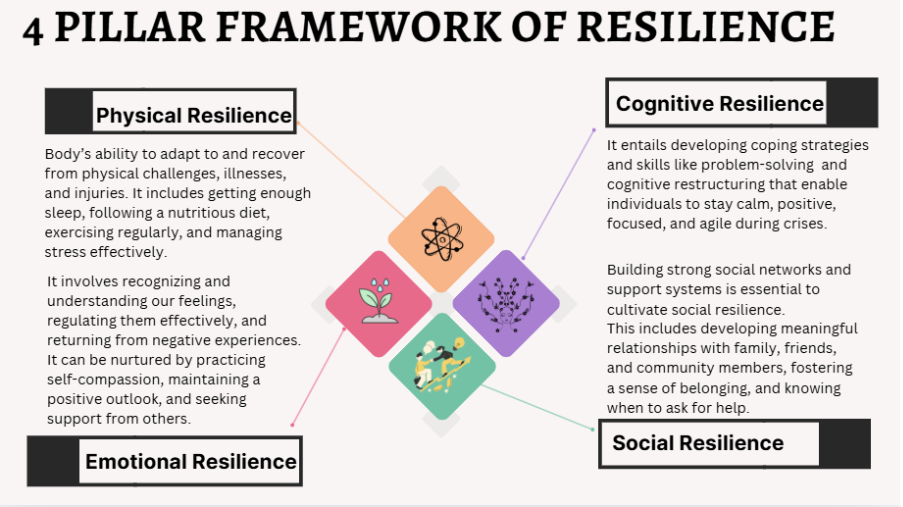
A Shift Towards Preventive Mental Health
In a society that can often glorify hustle culture, understanding the importance of resilience can be transformative.
Building resilience doesn’t mean avoiding emotions. It means cultivating inner strength and flexibility, one that adapts and moves forward. And in modern India — where uncertainty and rapid change are part of daily life — that skill might just be the most important one to keep learning.
9 Proven Ways to Build Your Resilience (Backed by Psychology)
Resilience isn’t built overnight — it’s strengthened through daily habits, mindset shifts, and the people we surround ourselves with. Here are nine practical and psychology-backed ways to build your resilience, especially in the Indian context.
Practise Cognitive Reframing (Train Your Brain to See the Bigger Picture)
Cognitive reframing is a psychological technique for shifting negative thoughts to more helpful ones. It’s a core principle in Cognitive Behavioural Therapy (CBT), which emphasizes that while we can’t control what happens, we can control how we think about it. For instance, being rejected from a job interview or ending of a relationship doesn’t have to mean “I’m not good enough.” It could instead mean “This wasn’t the right fit — I’m being redirected.” That’s a mindset shift in action.
In India, where “log kya kahenge” (what will people say) often drives emotional distress, learning cognitive flexibility helps you silence that inner critic. Reframing thoughts from self-blame to self-compassion is one of the effective ways to change negative thoughts and strengthen resilience.
Build a Strong Support System (Your People Are Your Safety Net)
Research shows that having a good support network can help to build resilience and make stress easier to manage. This support could include friends and family, colleagues, teachers, mentors, or counsellors. In India, close circles are powerful, but they can make it harder to show vulnerability due to stigma around emotions.
True support doesn’t mean being surrounded by people who always tell you to “be positive”. In fact, toxic positivity can make people feel ashamed of their real emotions and invalidate their pain. Real emotional support means having people who listen without judgement and validate your feelings, fostering the skill of resilience.
Practise Mindfulness and Breathwork (The Ancient Indian Secret)
The world is now catching up to what Indian traditions have taught for centuries — the power of mindfulness and breathwork.
Mindfulness is the state of being fully aware of the present moment. It is awareness of thoughts, feelings, bodily sensations, and your environment without judgment. Breathwork techniques such as Pranayama, box breathing, or short grounding meditations activate the parasympathetic nervous system — your body’s natural calm switch. Mindful journaling, yoga, and other spiritual practices such as prayer or meditation can also help people build connections and restore hope, priming them to handle situations that require resilience.
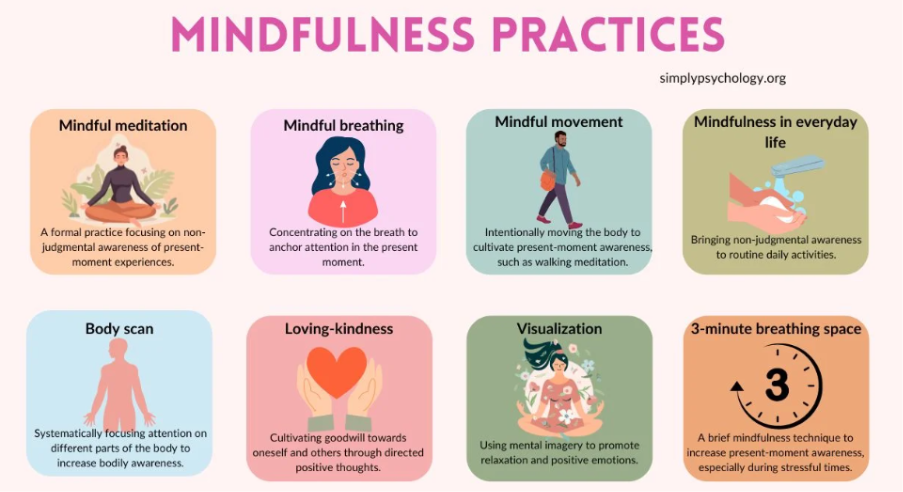
Clarify Your Purpose (Ikigai, Dharma, or Just a North Star)
Working toward things you believe in ensures that you'll stay motivated and committed even when times are tough. Knowing why you’re doing what you do gives life direction and meaning — whether it’s Ikigai from Japan or Dharma in Indian philosophy.
Try journaling prompts like:
- “What gets me up in the morning?”
- “What kind of person do I want to become?”
Even small goals — like helping someone daily or learning a new skill — strengthen meaning and hope.
Don’t Underestimate Sleep and Physical Health
Your physical well-being significantly impacts your resilience. A healthy body can cope better with stress and recover faster from illness or fatigue. Lack of sleep directly impairs emotional regulation and increases anxiety. Exercise, even brisk walking, releases endorphins that improve mood and focus.
In India, where late-night study or long work hours are common, prioritising rest is a much-needed act of self-care. Choosing simple, wholesome foods that support the gut–brain connection — like curd rice for probiotics or turmeric milk for calming the nervous system can be beneficial.

Talk to a Therapist or Counsellor
Therapy doesn’t have to be the last resort; it can be a training ground for building resilience. A mental health professional helps process stress, identify unhelpful patterns, and develop healthy coping tools.
Online platforms across India, including 1to1help counsellors, are making therapy more accessible today. Seeking help isn’t a weakness — it’s emotional maintenance, just like going to the gym is physical maintenance.
Accept Setbacks as Part of Growth
Every failure carries lessons. The concept of anti-fragility (coined by Nassim Taleb) explains that stress can sometimes actually strengthen us — just as muscles grow with resistance.
From an Indian startup failing to students re-attempting exams after setbacks, these experiences remind us that progress isn’t linear. Normalising failure and rejection as natural steps of growth is one of the most empowering forms of resilience.
Reduce Information Overload and Doomscrolling
In today’s digital bubble, information overload and doomscrolling have become second nature for most of us. And with constant overstimulation, healing of the mind becomes impossible. Research also shows that constant exposure to negative news or comparison on social media increases anxiety and hopelessness.
Practise a digital detox: set app limits, avoid late-night scrolling, or use tools like OneSec, Forest, or ScreenTime to reduce overexposure. During sensitive periods — layoffs, break-ups, or exam season — boundaries can be your best friend.
Try the Resilience Muscle Workout (Checklist)
Resilience isn’t built in a day — it’s built through repetition. Try this simple weekly self-check:
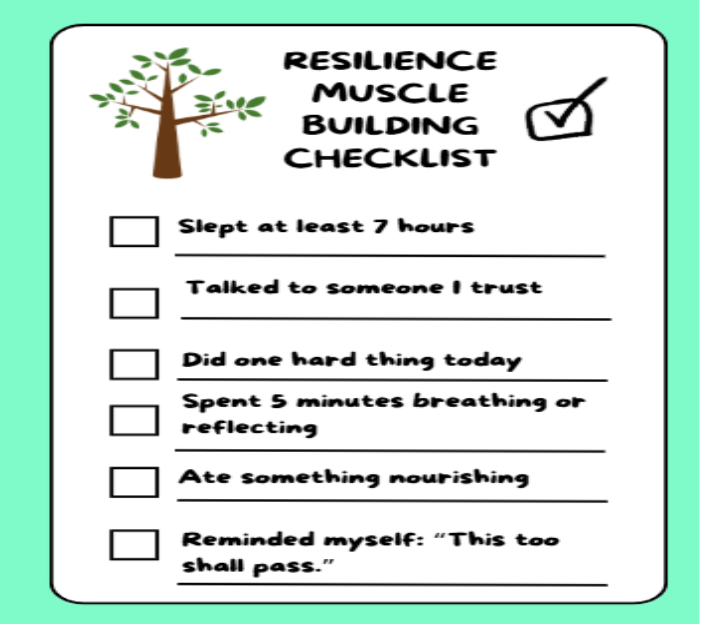
You can even use a Resilience Self-Assessment Tool to see where you stand track progress over time. Remember: every small act of self-care strengthens your mental strength and flexibility.
Resilience in India: Unique Cultural & Social Challenges
Cultural dynamics, family ties, and deep-rooted beliefs also shape resilience in our country. Understanding these influences helps us see why stress, coping, and recovery look different here than in Western contexts.
Collective vs. Individual Mindset
In many parts of the world, resilience means “standing on your own.” In India, it can often mean standing together. Our collective mindset encourages interdependence — families and communities support each other in times of crisis, offering strength and comfort. Yet, this same closeness can add pressure. Constant comparison and the fear of “societal expectations” can turn support into stress.
Learning to balance expectations with self-care is an essential part of coping with Indian family pressure and building emotional independence without guilt.
Social and Family Pressures
Many Indians grow up with the unspoken rule of making parents proud and upholding the family reputation. This means that others’ opinions often influence choices regarding career, marriage, kids, or lifestyle. Added nuances of caste, gender and religion shape how people perceive their success and impact stress levels. Resilience in this context would also mean navigating these pressures while staying true to one’s values.
Stigma and Spiritual Strength
The mental health stigma in India still discourages people from seeking therapy or sharing emotions openly. Changing this begins with conversations in homes, offices, and classrooms that normalise vulnerability.
At the same time, spirituality can play a strong protective role. Practices like prayer, meditation, or reading religious texts help people find hope and meaning in pain. When blended with psychological tools, faith becomes a pillar of strength.
Resilient mindset in India lies in this balance — drawing strength from tradition while learning to care for oneself with openness and compassion.
What Resilience Is Not (Common Myths)
Being resilient doesn’t mean that a person won’t experience difficulty or distress. In fact, the road to resilience is likely to involve considerable emotional distress. Sometimes, it can also be confused with quiet endurance. Resilience isn’t about ignoring pain — it’s about adapting and growing with awareness and self-care.
“Being strong” ≠ never crying
Early on, many people (especially men) are told, “Don’t cry. Be strong”. But emotional suppression can have an impact on mental health in the long run. Expressing feelings and navigating through them can build strength and resilience. For instance, a student preparing for IIT-JEE who allows themselves to cry after a setback can refocus better than one who avoids it.
“Being grateful” ≠ ignoring pain
Gratitude helps, but toxic positivity and saying “others have it worse” can invalidate real distress. A finance professional working 14-hour shifts may be told to “just stay positive,” but resilience means setting boundaries, seeking support, and making healthy changes, not pretending all is well.
“Just toughen up” is not advice
Phrases like “Deal with it” or “Toughen up” discourage help-seeking. Resilience isn’t about endless endurance; it’s about flexibility. An entrepreneur recovering from a failed startup shows resilience by learning, pausing, reflecting, and trying again—not by hiding the struggle.
Resilience is not being unbreakable, but learning to bend and bounce back with honesty and compassion.
FAQs
Q1. Can resilience be learnt later in life?
Absolutely. Resilience isn’t fixed — it’s a skill that can be built at any age. Even adults juggling careers, ageing parents, and financial pressures can learn coping tools such as mindfulness, reframing, and seeking social support. Indian professionals who start therapy or meditation in their 30s or 40s often see meaningful shifts in emotional balance and confidence.
Q2. Is resilience the same as mental toughness?
Not quite. Mental toughness focuses on endurance and discipline, while resilience involves flexibility, empathy, and recovery. A cricket player showing grit on the field may be mentally tough — but taking time to rest and process defeat shows resilience.
Q3. Do women face more challenges building resilience?
Yes, often due to social expectations and gender roles, Indian women balancing work, caregiving, and safety concerns face chronic stress. Still, many demonstrate resilience in action through community networks, self-help groups, or therapy.
Q4. Can kids be taught resilience in Indian schools?
Definitely, teaching children emotional regulation, problem-solving, and kindness early on helps prevent stress later. Schools in India introducing life-skills and mindfulness sessions are already fostering resilient, empathetic students.
Want to Go Deeper? Start with These 3 Actions Today
Action 1: 7-Day Mental Resilience Challenge
Resilience isn’t built overnight. It grows with time when you take tiny, consistent steps to face discomfort, reflect, and take care of your well-being.
Here’s your one-week plan to get started 👇
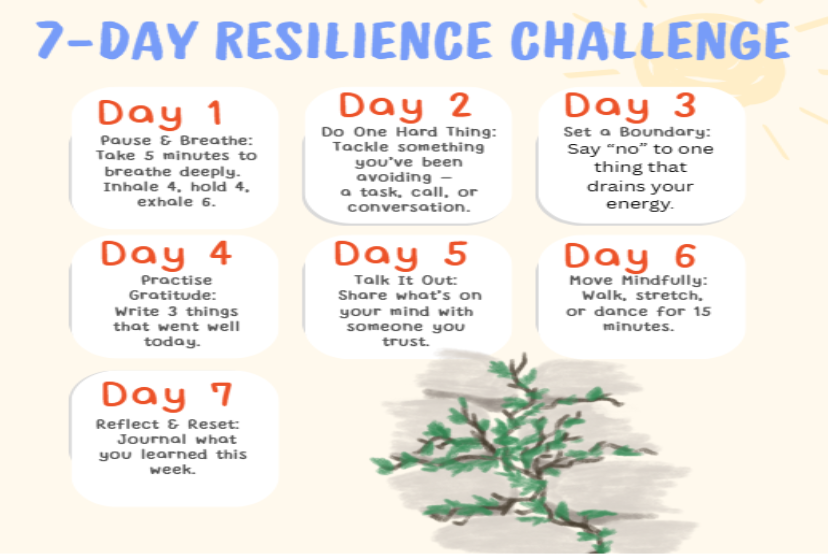
Action 2: Talk to a 1to1help Counsellor
Professional guidance can help you navigate stress and setbacks more effectively. Speaking with a qualified professional is a step towards development and healing, not a sign of weakness.
Action 3: Journal About Your Last Setback
Think back on the lessons you learnt, the coping mechanisms you used, and the things you would do differently the next time. The first step to change is awareness.
Need help building resilience? Our experts are just a click away.
Conclusion
Resilience is a skill that anyone can build, and every small step matters. Start practising today, reach out when you need help, and turn life’s challenges into opportunities to grow. Your stronger, calmer, and more confident self is just a decision away.
References
- 5 Effective Ways to Manage Stress https://indulge-thecollection.co.uk/2024/06/24/5-ways-effective-ways-to-manage-stress/
- American Psychological Association. (n.d.). Building your resilience. https://www.apa.org/topics/resilience/building-your-resilience
- Art of Living. (n.d.). What is pranayama? Types & techniques. https://www.artofliving.org/in-en/yoga/pranayama/what-is-pranayama-types-techniques
- Cleveland Clinic. (n.d.). Box breathing benefits. https://health.clevelandclinic.org/box-breathing-benefits
- Cleveland Clinic. (n.d.). Breathwork. https://health.clevelandclinic.org/breathwork
- Cleveland Clinic. (n.d.). Signs of burnout. https://health.clevelandclinic.org/signs-of-burnout
- Calm. (n.d.). How to be resilient. https://www.calm.com/blog/how-to-be-resilient
- Healthline. (n.d.). What is mindfulness? https://www.healthline.com/health/mind-body/what-is-mindfulness
- IIM Bangalore. (n.d.). Collectivism: Indian perspective. https://iimb.ac.in/turn_turn/collectivism-indian-perspective.php
- Mayo Clinic. (n.d.-a). Resilience: Build skills to endure hardship. https://www.mayoclinic.org/tests-procedures/resilience-training/in-depth/resilience/art-20046311
- Mayo Clinic. (n.d.-b). Strengthen your resiliency muscle. https://www.mayoclinichealthsystem.org/hometown-health/speaking-of-health/strengthen-your-resiliency-muscle
- Mayo Clinic. (n.d.-c). Stress management. https://www.mayoclinic.org/healthy-lifestyle/stress-management/in-depth/stress/art-20046037
- Mind. (n.d.). Managing stress and building resilience. https://www.mind.org.uk/information-support/types-of-mental-health-problems/stress/managing-stress-and-building-resilience/
- Mindbodygreen. (n.d.). 6 tips to build “gravity resilience”. https://www.mindbodygreen.com/articles/6-tips-to-build-gravity-resilience-and-how-you-can-benefit-from-it
- MyDiagnostics. (n.d.). Best foods for gut health: 20 Indian superfoods. https://mydiagnostics.in/blogs/nutritional/best-foods-for-gut-health-20-indian-superfoods-that-heal-your-digestive-system
- National Institutes of Health. (2022, April). Nurture your resilience. https://newsinhealth.nih.gov/2022/04/nurture-your-resilience
- Philosophy Institute. (n.d.). Dharma: Indian ethical traditions. https://philosophy.institute/ethics/dharma-indian-ethical-traditions/
- PositivePsychology.com. (n.d.-a). Resilience in positive psychology. https://positivepsychology.com/resilience-in-positive-psychology/
- PositivePsychology.com. (n.d.-b). Body-mind integration & attention training. https://positivepsychology.com/body-mind-integration-attention-training/
- PositivePsychology.com. (n.d.-c). Ikigai: Find purpose and meaning. https://positivepsychology.com/ikigai/
- Practical Strategies for a Calmer Life https://www.ultraupdates.com/2024/08/practical-strategies-for-a-calmer-life/
- Psychology Today. (2020, March). The antifragile mindset. https://www.psychologytoday.com/us/blog/digital-altruism/202003/the-antifragile-mindset
- Psychology Today. (2024, May). The health benefits of resilience and how to cultivate more of it. https://www.psychologytoday.com/us/blog/the-healing-factor/202405/the-health-benefits-of-resilience-and-how-to-cultivate-more-of-it
- Psychology Today. (n.d.). Resilience test. https://www.psychologytoday.com/us/tests/personality/resilience-test
- Ready Education. (n.d.). Strategies to build student resilience. https://www.readyeducation.com/en-us/articles/strategies-to-build-student-resilience
- Simply Psychology. (n.d.). Cognitive therapy. https://www.simplypsychology.org/cognitive-therapy.html
- Stanford Medicine. (2025, August). Sleep and mental health: What science says. https://med.stanford.edu/news/insights/2025/08/sleep-mental-health-connection-what-science-says.html#:~:text=In%20short-term%20studies%2C%20sleep%20deprivation%20has%20been%20shown,that%20sleep%20and%20mood%20have%20a%20bidirectional%20relationship
- Verywell Mind. (n.d.-a). Ways to become more resilient. https://www.verywellmind.com/characteristics-of-resilience-2795062#toc-examples-of-resilience
- Verywell Mind. (n.d.-b). What is gratitude? https://www.verywellmind.com/what-is-gratitude-5206817
- Verywell Mind. (n.d.-c). What is toxic positivity? https://www.verywellmind.com/what-is-toxic-positivity-5093958
- World Health Organization. (n.d.-a). Depression: Fact sheet. https://www.who.int/news-room/fact-sheets/detail/depression
- World Health Organization. (n.d.-b). Anxiety disorders: Fact sheet. https://www.who.int/news-room/fact-sheets/detail/anxiety-disorders
- LiveWell WorkWise. (n.d.). Unleashing your inner strength: Four types of resilience. https://livewellworkwise.com/unleashing-your-inner-strength-a-guide-to-the-four-types-of-resilience/










